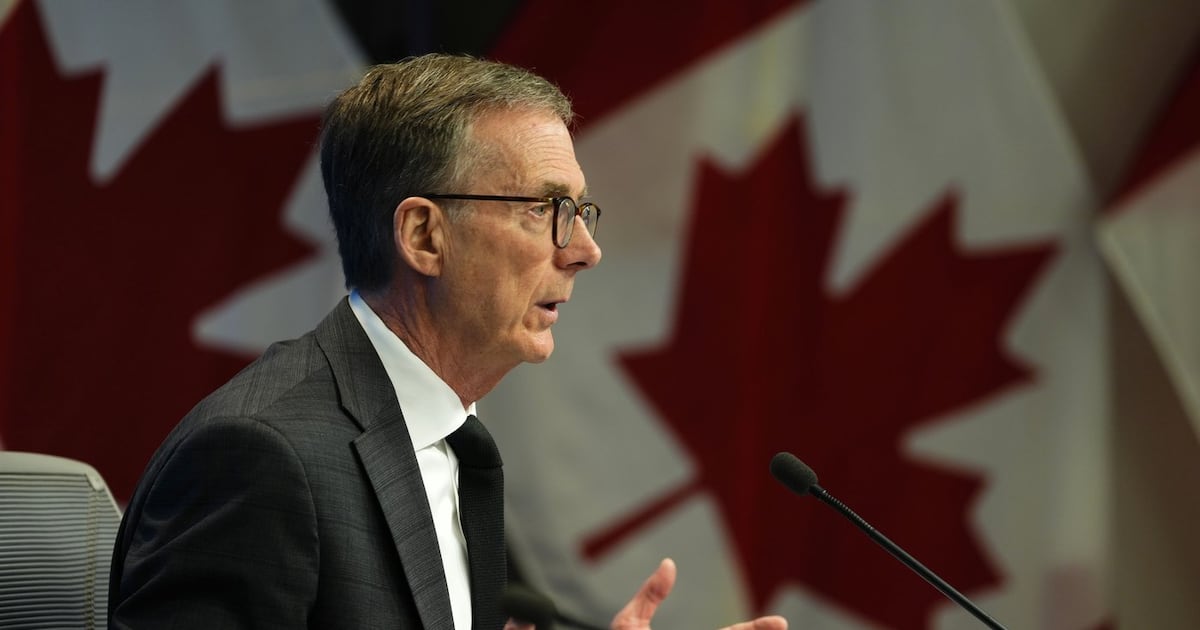The head of the Bank of Canada says the country waited too long to reduce its economic dependence on the United States and is paying the price today.
Governor Tiff Macklem was in Saskatoon Tuesday giving a speech about global trade disruption to Saskatchewan business leaders.
He warned that U.S. President Donald Trump’s tariffs have hit trade-sensitive industries hard in Canada and put economic growth on a permanently lower trajectory.
To break free of its reliance on the U.S. economy, Macklem argued that Canada needs to develop new global markets for its products and knock down the internal barriers hampering productivity.
He drew a comparison to the 2008-09 global financial crisis and the spillover effects a U.S. collapse at the time had on Canada.
“Everyone talked about diversification then, too. But not much happened,” Macklem said in his speech.
Macklem told reporters after his speech that Canadian businesses lost “urgency” when the recession faded away and U.S. demand returned.
The United States will likely always be Canada’s largest trading partner, he said.
But Macklem also said that Canada and the U.S. aren’t going through a “cyclical downturn” this time, and there won’t be a bounceback in growth unless business leaders and policymakers take action to restructure parts of the economy.
“This time, we need to follow through,” he said.
The Bank of Canada lowered its benchmark interest rate by a quarter point to 2.5 per cent last week as signs of weakness in the economy shifted the risks away from rising inflation.
Real gross domestic product fell in the second quarter of 2025 as Canadian exports tanked; Canada’s labour market is also showing cracks, particularly in tariff-struck industries.
Exemptions under the Canada-U.S.-Mexico agreement are shielding most Canadian goods from U.S. tariffs, though sector-specific duties on steel, aluminum, autos and softwood lumber are hurting those industries. Macklem noted China’s tariffs on Canadian canola are the trade disruption having the sharpest effect on the Saskatchewan economy.
The impact from U.S. tariffs has so far been more muted that first feared, Macklem said, but he warned the full fallout is yet to be seen.
He said Canada has already started taking its first steps toward girding the economy against future disruption, but also argued the hard work must begin now.
Macklem called for better east-west transportation corridors and improvements to port infrastructure to help get Canadian goods to overseas markets. Those efforts could help reduce Canada’s reliance on U.S. markets and make better use of the country’s existing free-trade agreements with nations around the world.
He also pushed for the end of interprovincial trade barriers, harmonizing regulatory frameworks across provinces and a general shortening of approval times to help boost Canadian productivity.
Combined, Macklem said these measures could help lift the path of Canada’s economic growth to surpass the trajectory seen before the U.S. tariff disruption.
“Canadian leaders – business, political and economic leaders – need to chart a new course. We should have been making these changes 15 years ago. But the next best time is now,” he said.
The head of the Canadian central bank also weighed in on Trump’s efforts to influence and reshape the U.S. Federal Reserve – the Bank of Canada’s counterpart south of the border.
Trump has ordered the removal of Fed governor Lisa Cook in a case that’s set to be decided by the U.S. Supreme Court, and reportedly floated firing Federal Reserve Chair Jerome Powell.
The Fed, like the Bank of Canada, cut its policy rate by a quarter point last week, though Trump had pushed for faster easing.
Macklem said during his speech that Trump’s attempts to influence the Fed “are raising questions about the continued independence of U.S. monetary policy.”
“The lesson from history is clear … central banks that have operational independence for monetary policy do a better job at delivering price stability for its citizens,” he told later reporters.
Macklem also warned that threats to financial stability in the United States will have knock-on effects elsewhere in the world and are already “starting to have consequences in financial markets.”
He also said that his U.S. counterpart Powell “is doing a very good job under very trying circumstances, and he is guiding monetary policy based on evidence, not politics.”
This report by The Canadian Press was first published Sept. 23, 2025.
Craig Lord, The Canadian Press

